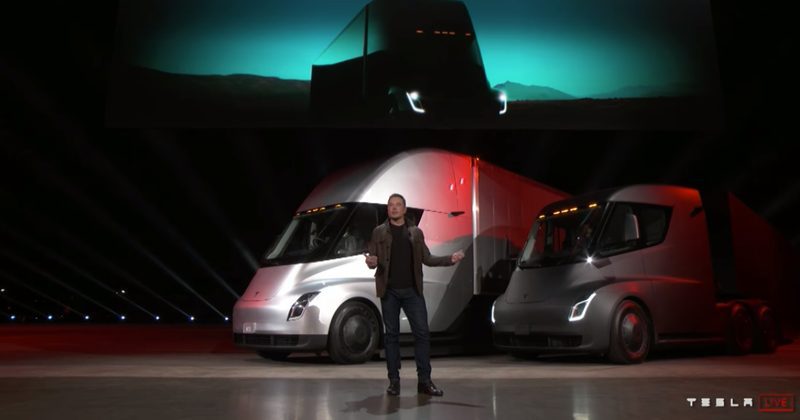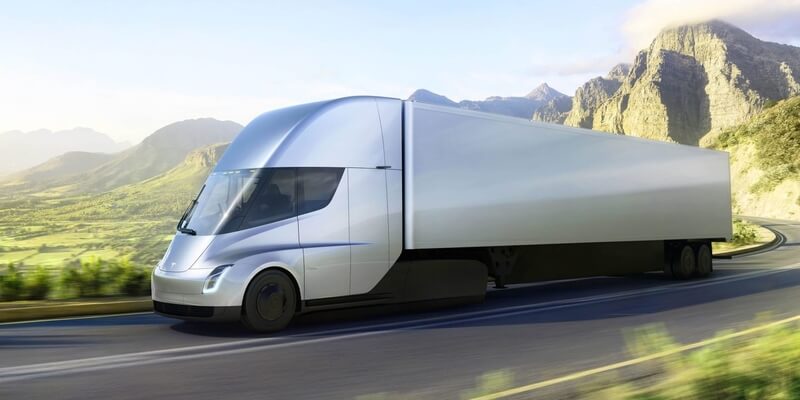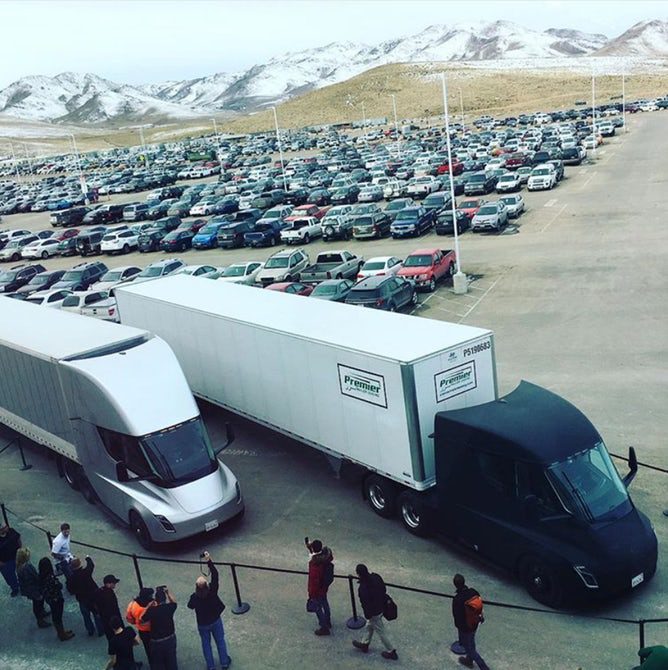
It was November of last year when Elon Musk, as Founder and CEO of Tesla Motors, revealed his very own version of an electric semi truck, simply called the Tesla Semi.
The electric behemoth can pull along 40 tons of load with a maximum speed of 104km. With the aerodynamics design presented to beat a premium sports car, it is said to range at about 800km at full charge.
Oh, and with the use of “Mega-chargers”, drivers could charge it for 30 minutes and drive for up to 640km before needing to charge again.
All these unreal numbers mean that Elon Musk wants to transform how the logistics industry works, by building the most badass looking truck ever.

The trucks have even started operation very recently too!
Here’s why we think this Tesla Motors creation will change the future of logistics.
1. Goods transportation is going to be way greener
Based on Frost & Sullivan’s research on the transformation in the trucking industry, one of the four fundamental shifts is Electrification.
Tesla isn’t the first to developed a full electric truck to use for goods transportations. Companies such as Volkswagen, Nikola, Daimler, Cummins and others had jumped ahead way earlier.
But these other trucks do not have the numbers presented by Musk, and none are said to start production in 2019.
As you might have known, big cargo trucks driving along the highway has somewhat of a bad reputation. Besides the mounting cases of accidents and crashes, it is also frowned-upon because of it being not so environmentally friendly.
2. Total operations cost can be lowered significantly
Going back to its performance, Musk has said that can pull 40 tons of backload while still being able to accelerate to 100km/h in 20 seconds.
“If you are pulling a load over the Rockies or some mountains strain up a hill, you are earning 50% more per mile than you are in a diesel truck,” said Musk during the launch event.
Musk also have highlighted how the truck can potentially shift the industry’s paradigm on its total cost of operations by combining leasing, insurance, and maintenance cost as a bundle. This may significantly lower the usual cost of keeping a fleet of trucks in the long run.
3. Trucks to be way safer
And speaking of accidents, the Tesla Semi is said to be equipped with safety features you won’t even believe existed. Mainly to prevent jack-knifing with its independent motors on each wheel.
The freight is also equipped with an auto-pilot system that knows exactly what to do if the truck comes in to close with another vehicle.
Plus, the design accentuates a lower centre of gravity which makes it harder for it to tip an d rollover.
And in terms of the interior design, the driver’s seat is positioned at the very centre, and he/she will have two display touchscreens to view everything there is to know about the truck while driving.
I mean, if this isn’t making truck drivers cool, we don’t know what will.

4. Potential increase in job prospect
Seriously, how cool would it be to drive one of these things? The Tesla Semi may be able attract the younger generations of the workforce to join the ever-present logistics industry, as a cool Tesla truck driver.
5. Full digitisation of freight management
And we mean FULL digitization, not just in terms of live tracking and digital Delivery Order sheets.
It has been found that a single truck being fully utilized while on the road is only around 56% in the US, and about 54% in the EU. The problem exists here in Malaysia too, as trucks with empty backloads travelling long-haul are still ever-present.
Then there’s problem in unavoidable idle times such as sitting at toll gates, traffic, and during loading and unloading.
The Tesla Semi – at least on paper, aims to tackle these under-utilizations and delays by being “digital-native”. It is said to enable usage of empty mile-saving solutions such as an automated freight management and by technological advancements to significantly improve freight utilisation.
You know Tesla is a digitally-driven company, so you can bet there will be digital solutions being sold together with the trucks as well. Though whether any of it would work as well as it claims to remains to be seen.
6. Trucks as an upgradeable solution
The industry as a whole views their freights as more of a one-off product, maintaining it as best as they can to get the most miles out of it before it goes into the scrapyard.
Though with how Tesla puts it, the Semi may become a more complete and “upgradeable” solution to freight operations.
The ecosystem which Tesla brings along with their products would convey that fully electric trucks WILL be a mainstay in the not-so-distant future, and makes it easier to maintain and have them in operation longer, with lesser costs.
7. Bottom line

Two Tesla Semis on their first job, transporting from Nevada to California.
It seems that so far the Tesla Semi is a godsend for the betterment of the logistics industry, or so it should be.
Though it seems that a few giants such as UPS, Pepsi, and Anheuser-Busch have already bought in, this effort Tesla – and Musk himself – has journey upon with the Tesla Semi is a risky one, a VERY risky one.
What Musk has presented to the world during the event last year was earth-shatteringly disruptive, people are doubting whether any of it could be possible to mass produce by 2019, if at all.
The challenges it could be facing is tremendous, from the sourcing of cobalt for its Lithium-ion batteries, to ensuring its so-called Mega chargers infrastructure is even viable, and to actually start production by next year.
This is not considering the actual cost for a company to adopt Tesla’s shiny new freight management ecosystem.
And let’s be real, the chance for the Tesla Semi to even scrape the Malaysian tarmac is slimmer than our breakfast roti canai.
What is for certain now is that Tesla is committing 100% on launching the Tesla Semi, and they are not backing down. If Musk’s other venture, SpaceX is to be a reference, nothing is impossible for them.
At least there’s a bigger chance for the Tesla Roadster to be on Malaysian roads though, and that technological marvel is another article altogether.
As for now, let’s see whether this futuristic truck can live up to its name.




 MY – EN
MY – EN Singapore
Singapore Indonesia
Indonesia